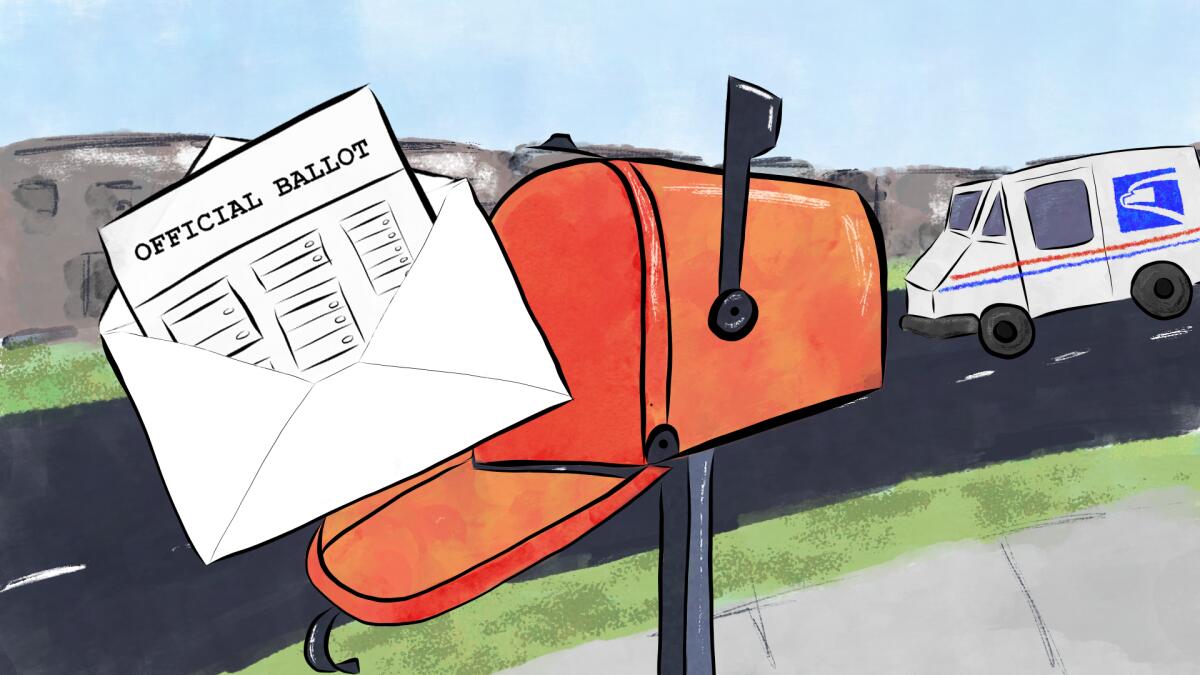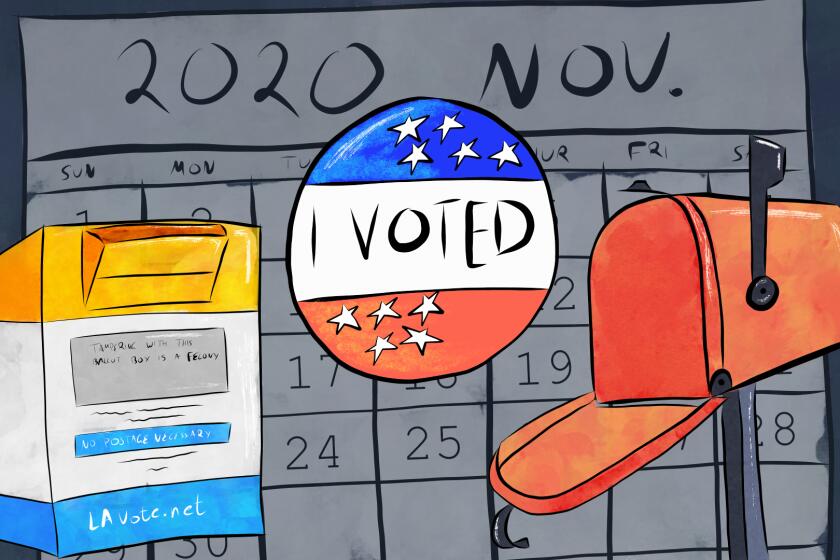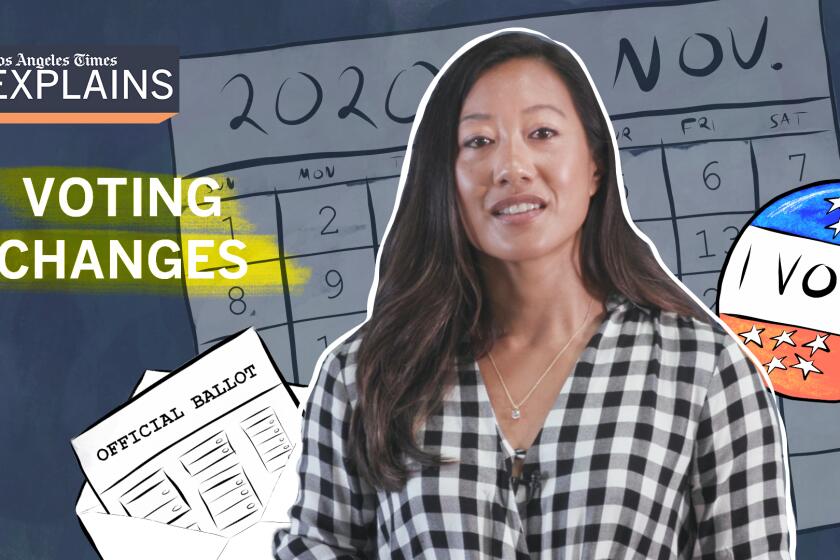Here are the 12 propositions on California’s November ballot

- Share via
SACRAMENTO — California’s November election will feature 12 statewide ballot measures, dominated by an effort to repeal a ban on the consideration of race and gender in hiring and admissions decisions as well as complex rules on property taxation and criminal justice.
The combustible mix of proposals was presented on Wednesday by Secretary of State Alex Padilla and will be considered by what could be a record-high turnout of voters. Eight propositions earned a spot on the Nov. 3 ballot through the collection of voter signatures by prominent interest groups. Four were added to the list by the Legislature last month, each proposing to amend the California Constitution.
Here’s a quick glance at the key question each proposition will ask California voters to answer.
Proposition 14: More borrowing for stem cell research

If Proposition 14 passes, it would allow the state to borrow more money to continue stem cell research at the state government level. It would include some rules for how those funds are spent.
It’s been 16 years since California voters approved borrowing $3 billion to finance a state government stem cell research program. The research organization created by that 2004 ballot measure has funded a variety of research projects and clinical trials, much of it through the University of California.
But now, the $3 billion has almost completely been spent. And the backers of the original effort want voters to authorize another round of borrowing by issuing $5.5 billion in government bonds to continue stem cell research. The total cost will be higher once interest payments are figured in.
There would be a few more rules for how research funds are spent by the California Institute for Regenerative Medicine, the entity created by the 2004 ballot initiative. That includes a mandate to improve patient access to stem cell treatments. New grant awards would also be prioritized by projects that would use matching funds from outside sources. And some of the governance structure of the institute would also be changed in ways that supporters believe will improve public oversight.
Proposition 15: The battle over commercial property taxes

If Proposition 15 passes, it would increase property taxes for businesses and corporations in California, undoing some tax breaks introduced by Proposition 13 in 1978.
This is the political battle everyone has been expecting for decades, a long-debated effort to revise the property tax rules that have existed in California since the passage of the legendary Proposition 13 in 1978.
The ballot measure seeks to create a set of new rules for commercial property taxes while leaving the existing rules for residential property taxes in place. Commercial property owners would see their taxes go up and the resulting tax revenue would go to local government services and schools. The details, of course, are a little more complex.
Proposition 15 would allow market-rate values for commercial and industrial properties to be used as the basis for assessing property taxes owed and would phase in that change over three years. Some properties occupied by small businesses would have a longer transition period to the higher taxes, while some business property owners would be exempt from the new law.
The campaign will likely focus on whether the new tax revenue collected by loosening Proposition 13 — perhaps as much as $12.5 billion a year under one nonpartisan analysis — would outweigh any potential economic impact of requiring some businesses to pay more to operate in California. A variety of Democratic-leaning advocacy groups, including organized labor, believe it would. Business groups disagree and are staunchly opposed. This will be an expensive — and bitter — battle for your vote.
Proposition 16: A return to affirmative action

If Proposition 16 passes, it would bring back affirmative action, allowing race, ethnicity and gender to be considered in awarding government contracts and in deciding admission to the state’s colleges and universities.
It’s been 24 years since California voters considered whether race, ethnicity and gender should be considered in awarding government contracts and admission to the state’s colleges and universities. The politics and demographics of the state were far different in 1996, when such considerations were outlawed with Proposition 209, an amendment to the California Constitution.
This ballot measure is only nine words long. It would simply repeal Proposition 209, allowing the practice often described as affirmative action to again be used in state. It was added to the ballot by the Legislature last month, setting up a discussion about systemic racism and inequities at the same time as a national reckoning on these topics.
Proposition 17: Would allow parolees to vote

If Proposition 17 passes, it would allow parolees – those released from prison but finishing a sentence – to vote.
There is a big difference between probation and parole in criminal justice and, at least in California, when it comes to having the right to vote. Probation is part of the sentence handed down and often allows those convicted of a felony to avoid time behind bars; parole begins upon release from prison, in advance of when the sentence ends.
But the California Constitution allows someone on probation to vote, while removing the voting rights of a parolee until the time of parole has been completed. This proposal, placed on the ballot by the Legislature, would remove that restriction and allow a person on parole to vote.
Rules barring parolees from voting vary by state, though the trend has been toward restoring those rights. A survey conducted by a pro-voting rights group last year estimated that the ban on parolees voting in elections affects about 40,000 Californians.
Proposition 18: Would allow some 17-year-olds to vote

If Proposition 18 passes, it would allow 17-year-olds to vote in the March primary, as long as they turn 18 by the November election.
This constitutional amendment, placed on the ballot by the Legislature, would allow 17-year-olds to register and vote in primary elections if they turn 18 by the time of the general election in November.
At least 18 states have similar laws on the books, according to data compiled by the National Conference of State Legislatures. Supporters of the proposal argue that more of these new voters will get engaged with issues if they can participate in a full election cycle. As it stands now, an 18-year-old Californian whose birthday was after the March 3 presidential primary missed out on the chance to pick some candidates and now gets to vote only for one of the smaller group of hopefuls who made it to the Nov. 3 ballot.
Proposition 19: Adding and subtracting property tax breaks

If Proposition 19 passes, it would give continued property tax breaks to Californians age 55 and older who want to move.
The final measure added to the Nov. 3 ballot by the Legislature replaced a similar initiative drafted by the California Assn. of Realtors. Both had similar goals, but this measure is a bit more far-reaching.
If approved by voters, California homeowners who are 55 or older can purchase a new home and keep their property tax payment at the same level or a reduced rate — depending on the value of the new house. This expands a long-standing program that is available only in a few counties. The impact is clear: Older Californians who might otherwise be reluctant to change homes and pay higher property taxes would receive a new break.
Proposition 19 also expands the property tax break for older homeowners to those who lose their home to a wildfire, a program now limited to other kinds of natural disasters.
The ballot measure also cracks down on the transfer of a home from a parent to an adult child in which the property tax payment doesn’t change. In 2018, a Times investigation found wealthy Californians — including the families of Hollywood celebrities — who charged monthly rents much higher than the annual tax payment. This ballot measure would narrow the tax break to homes being lived in by the owner , and would place a new limit on how much of a home’s value could remain unchanged when the property was transferred. Most of the resulting revenues collected by narrowing this tax break would go toward local firefighting efforts.
Proposition 20: Tougher on parole, property crimes

If Proposition 20 passes, it would restrict the option of early parole for more crimes and increase penalties for certain theft-related crimes.
California voters have weighed in twice in recent years to reduce the punishment for crimes considered by existing law to be among those less serious than violent felonies. In 2014, Proposition 47 was passed to reduce the penalties for some theft and drug crimes. In 2016, Proposition 57 offered a chance of parole to some serving prison sentences for crimes that don’t fall on the state’s list of violent crimes.
Both laws have been the subject of intense debate over whether they are the right step toward reducing the prison population and promoting rehabilitation or a wrong step that has led to an escalation in crime by repeat offenders.
This ballot measure would place new limits on some of the sentence reductions included in Proposition 47 and Proposition 57. It would allow some theft-related crimes to be charged as felonies and it would create two new crimes: serial theft (applicable only to a select list of crimes and to defendants who have prior convictions for certain crimes) and organized retail theft (two or more people involved in some theft crimes within a 180-day period). Both crimes could result in jail time.
Proposition 20 also would change the 2016 parole law championed by then-Gov. Jerry Brown, which blocked inmates convicted of crimes including human trafficking and solicitation from being considered for early release. It also would change some of the rules that must be followed by the state Board of Parole Hearings and community probation programs. And it would expand DNA testing to require samples be taken from some people convicted of theft and domestic violence.
Proposition 21: Rent control redux

If Proposition 21 passes, it would allow cities and counties in California to implement even stricter rent control policies.
Growing concerns over California’s lack of affordable housing have made rent control — a government-imposed cap on what landlords can charge their tenants — a hot topic in the state’s biggest cities and at the state Capitol. Last year, Gov. Gavin Newsom signed a law restricting annual rent increases to no more than 5% plus inflation, one of the strictest statewide caps on rent hikes in the country.
That law was written after California voters rejected a statewide rent control measure in 2018 championed by Los Angeles activist Michael Weinstein. This year, he’s trying again. Weinstein filed his new initiative just months after the defeat of his former effort, Proposition 10.
The 2018 ballot measure would have rescinded a state law that limits new local rent control ordinances. Proposition 21 is more modest, and would instead narrow that law. If it passes, cities and counties could apply rent control to housing that is more than 15 years old, with the exception of some single-family homes. The ballot measure would allow local governments to impose limits on rent increases when a new renter moved in.
The measure would supersede any local rent control rules. In Los Angeles, for example, it could mean many more housing units would be eligible for limits on what a landlord could charge.
Proposition 22: Special workplace rules for the gig economy

If Proposition 22 passes, it would allow companies like Uber and Lyft to continue to consider their workers as independent contractors, as opposed to full-time employees.
The bitter fight over designating a worker as an employee or an independent contractor dominated the final days of the legislative session in Sacramento last year. The resulting law, Assembly Bill 5, imposes new criteria to determine the correct employment status for what was estimated up to 1 million Californians.
But AB 5 wasn’t the end of the battle, with critics arguing that additional flexibility is needed in a variety of professions. Few were as unhappy with the law as app-based companies Uber and Lyft, which joined forces to immediately file a ballot measure creating another set of rules that would apply to their drivers.
In its simplest form, Proposition 22 would clearly designate those drivers to be independent contractors — contrary to what Democratic legislators and labor unions that backed AB 5 intended. But the companies wrote the ballot measure in a way that would offer those drivers several new but smaller benefits than they would have if they were actual company employees.
Drivers would be guaranteed an hourly wage — slightly above the state minimum wage — for time spent driving; a monthly health insurance stipend for some drivers, based on the hours they work per week; new medical and disability benefits if a driver is injured while driving; and new rules pertaining to rest periods, sexual harassment and criminal background checks.
In doing so, the ballot measure would distinguish the rules for app-based contractors from those applying to other sectors of the California economy.
Proposition 23: Kidney dialysis clinic rules revisited

If Proposition 23 passes, it would increase rules for kidney dialysis centers, such as requiring at least one physician to remain on-site during a dialysis center’s operating hours.
Like the do-over ballot measure on rent control, this is the second straight November election in which California voters will be asked to approve a new law governing kidney dialysis clinics in the state.
About 600 dialysis clinics in California serve about 80,000 patients per month, according to a state legislative analysis. To address the patients’ needs, clinics often operate longer hours each day and are open for six days a week.
The ballot measure would require every clinic to have at least one physician present during all operating hours. The clinics would have to offer the same level of care to all patients, regardless of whether the treatment is paid for by private insurance or a government-funded program such as Medi-Cal or Medicare. Clinic administrators would have to report more information about infections among their dialysis patients, and the state Department of Public Health would have a new role in agreeing to changes at a clinic or its closure.
The initiative was placed on the ballot by a union representing healthcare workers and will be opposed by the dialysis clinics, with other healthcare industry groups also weighing in by election day. These were largely the same forces that fought it out over Proposition 8 in 2018, which also would have imposed new rules on dialysis clinics and was rejected by voters.
Proposition 24: New consumer privacy rules

If Proposition 24 passes, it would make changes to California’s new consumer privacy law, allowing consumers new rights to limit the sharing of their personal information.
California’s sweeping new consumer privacy law went into effect in January and strict state enforcement began on July 1. It gives individuals much more control over data collected by a variety of businesses. Consumers must be told if data is being collected or sold, they can ask that their information be deleted and businesses are prohibited from charging more to customers who ask for more privacy.
The measure on November’s ballot, championed by a San Francisco real estate developer who pushed lawmakers to enact the 2018 law, goes further. It creates a new definition in state law of data “sharing” in an attempt to make more businesses subject to privacy rules. Consumers would also have new rights to limit the sharing of their personal information and to correct inaccurate information.
Penalties for companies that break the law would go up under Proposition 24, with even higher fines for information related to children. And a new consumer protection agency would be established in state government.
Proposition 25: Yes or no on cash bail

If Proposition 25 passes, it would eliminate cash bail, which requires suspects to pay a cash bond to be released from jail while waiting for their trial.
This measure is a referendum, a special kind of ballot measure asking voters whether to approve or reject a law passed by the Legislature. In this case, it’s the fate of a 2018 law abolishing cash bail in California.
Companies representing the bail industry quickly gathered signatures on a referendum after the law was signed. As a result, it’s been on hold and is awaiting a final decision by voters this fall.
That the bail companies sought a second opinion isn’t surprising. The historic law would eliminate the industry’s practice of offering cash to those who can’t afford to pay for early release. Instead, the law gives judges wide discretion to decide who can be released prior to trial. Defendants deemed to be a danger to the community could be held under a policy known as “preventive detention.”
A wide array of state officials, including California’s chief justice, support the law. Civil rights groups, in particular, say the cash bail system too often has led to decisions based less on public safety and more on the ability to pay.
Voters who say “yes” on this measure will be giving their approval of the law to end cash bail. Voters who say “no” will be rejecting the law and affirming the system as it has existed for decades.
Mail-in ballots, registration deadlines, voting centers — we’ve got you covered with the basics of voting in the Nov. 3 election.
More to Read
Sign up for Essential California
The most important California stories and recommendations in your inbox every morning.
You may occasionally receive promotional content from the Los Angeles Times.













